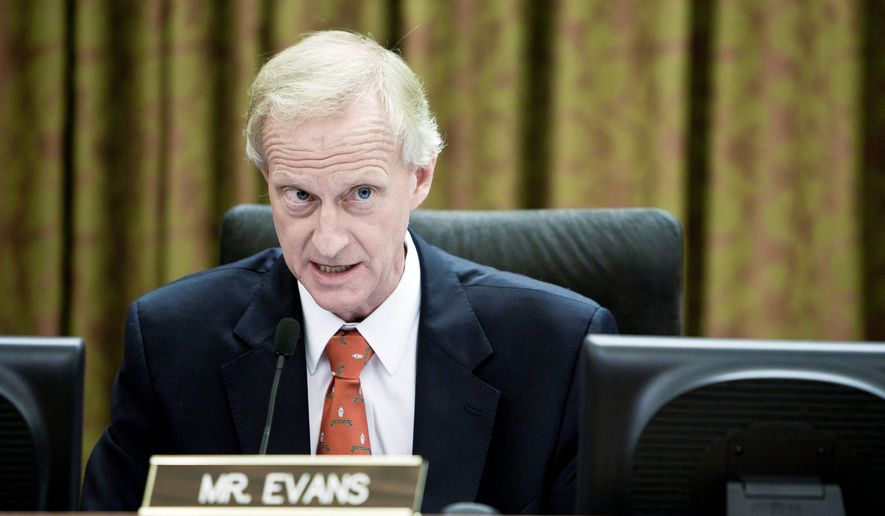Metro Board Chairman Jack Evans asked Congress Wednesday to step up funding to help fix the ailing transit system, but was quickly rebuffed by Republican lawmakers who said they wouldn’t fund the project on the backs of federal taxpayers.
“More relevant to today’s hearing, the federal government, an equal partner in governing the system with four board members, should contribute $300 million per year to the operating budget just like D.C., Maryland and Virginia,” Mr. Evans told the House Government Oversight subcommittees on transportation and government operations.
But Rep. John Mica, the Florida Republican who heads the transportation subcommittee, nixed Mr. Evans’ request and suggested the District foot the bill since it has a budget surplus and is doing well financially.
“I am not going to bail you out. I won’t support bailing out the District of Columbia,” Mr. Mica yelled from the dais. “What is this? Budget autonomy?”
The joint subcommittee hearing was held about a month after Metro’s unprecedented 29-hour shutdown for safety inspections of its subway power cables that have caused two fires over the past 16 months, including the fatal smoke incident at L’Enfant Plaza in January 2015 that left one passenger dead and 86 others injured. Inspectors identified several problem areas, and Mr. Evans said in late March that some rail lines could be shut down for months at a time for repairs.
On Wednesday, Mr. Evans, who is also the Ward 2 Democrat on the D.C. Council, reiterated a long-standing argument for federal funding for Metro — that while many federal workers rely on Metro, the U.S. government doesn’t pay anything for the system’s operations.
SEE ALSO: D.C. EMTs say private ambulances have not provided time for training
Congress sets aside $150 million a year for the country’s second busiest transit system, but that money goes to capital construction projects.
Mr. Evans said Metro will need about $25 billion over the next 10 years not only to operate the system but to fix it, as well. By fiscal 2018, Metro will face a $150 million budget shortfall without any extra funding, he said.
The system’s current operating budget is about $1.8 billion.
“If we leave here today and do nothing you say you’re not going to give us a dime? Really? Give me a break. Next time something happens, I’m blaming you guys. We transport half your staff to work,” Mr. Evans told the lawmakers.
Delegate Eleanor Holmes Norton, the District’s nonvoting representative in Congress, rose to Mr. Evans’ defense.
“When Metro shuts down, the federal government shuts down. So just try getting along without Metro if you want a federal government at all,” said Ms. Norton, a Democrat.
SEE ALSO: Metro Transit, D.C. police to beef up patrols at Deanwood Metro in Northeast
Rep. Gerry Connolly, Virginia Democrat, said he has been working on Metro issues for 21 years. He chided Mr. Mica for saying his constituency shouldn’t be burdened with Metro’s problems.
“[The federal government] went AWOL. We don’t pay an operating subsidy. You talk about burden on your people? Well I don’t want a burden on mine,” Mr. Connolly said. “In Virginia, we pay the subsidies. While you care about your people, we care about ours.”
As the back and forth wore on, it was clear House Republicans would not submit to handing over any extra funding for Metro.
In his testimony, Paul Wiedefeld, Metro’s new general manager, didn’t hide what it would take to fix Metro’s ailments.
“The safety culture at Metro is not integrated with operations nor well-rooted at all levels,” Mr. Wiedefeld said. “We have gone from crisis to crisis. We deal with things one-off. That cannot continue. These solutions won’t be easy so I’m not going to sugar coat it.”
Mr. Wiedefeld said he will release in several weeks a long-term plan to repair the 118-mile network. In March he released a short-term plan that outlined 47 “specific actions to improve safety, reliability, financial security and restore the public trust.”
He said Metro will add to the list when necessary.
“Then we’ll continue to maintain it from there,” he said, noting that 65 percent of the connectors that caused the subway smoke incidents have been repaired or replaced.
The hearing came a day after Metro released a report from consultants McKinsey & Co. that outlined problems in three areas: reliability, fiscal sustainability and safety. The Metro Board hired the firm to help set priorities with Mr. Wiedefeld on the best way to get the transit agency back in shape.
• Ryan M. McDermott can be reached at rmcdermott@washingtontimes.com.




Please read our comment policy before commenting.